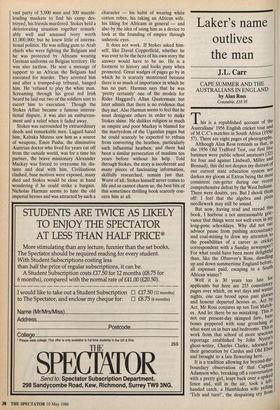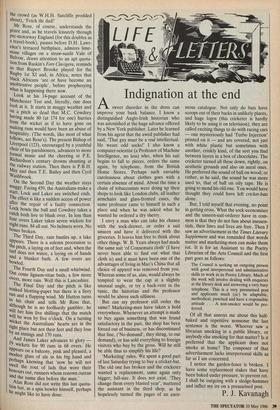Laker's name outlives the man
J.L. Carr
CAPE SUMMER AND THE AUSTRALIANS IN ENGLAND by Alan Ross
Constable, 00.95
This is a republished account of the Australians' 1956 English cricket tour and of M.C.C's matches in South Africa (1956/ 57). There are eight pages of photographs. Although Alan Ross reminds us that, ill the 1956 Old Trafford Test, our first five batsmen were public school amateurs (321 for four and against Lindwall, Miller and Benaud), this did not deepen my distrust of our current state education system nor darken my gloom at Extras being the most consistent run-getter during our recent comprehensive defeat by the West Indians. There were doubts, yes. But I shook themll off: I feel that the algebra and plain needlework may still be sound. But now, having read and reread this book, I harbour a not unreasonable grie- vance that things were not well even In illY long-gone schooldays. Why did not our advisor pause from pushing accountancy and coal-mining to draw my attention t° the possibilities of a career as crickCit correspondent with a Sunday newspaper. For what could have been more delightful than, like the Observer's Ross, dawdling up and down summertime England before, all expenses paid, escaping to a South African winter?
Well it is 30 years too late for applicants but here are 255 consolatorY pages over which, on wet days and winter nights, one can brood upon past glones and honour departed heroes as, Act bY Act, Mr Ross conjures up ten Test Match: es. And let there be no mistaking. This Is not our present-day skimped fare, bare bones peppered with sour grouching. at what went on in bars and bedrooms. This Is work from that school of more spacioT reportage established by John Nyred. s ghost-writer, Charles Clarke, adorned in their generation by Cardus and Old Eb°r and brought to a late flowering here. It is a tradition allowing for beyond-the' boundary observation of that Captain Adamson who, breaking off a conversation with a pretty girl, leapt back over a spiked fence and, still in the air, took a left' handed catch, a Hambledon wife yelling `Tich and turn!', the despairing cry frciin the crowd (as W.H.H. Sutcliffe prodded about), 'Fetch thi dad!'
Mr Ross, of course, understands the genre and, as he travels leisurely through pre-motorway England (for this doubles as a travel-book), pauses before D.H. Lawr- ence's terraced birthplace, admires lime- stone villages on a straw-sunlit Vale of Belvoir, draws attention to an apt quota- tion from Rusldn's Fors Clavigera, reminds US that Rupert Brooke played for the Rugby 1st XI and, in Africa, notes that black Africans 'are or have become an unobtrusive people', before prophesying what is happening there now. Look at his 14-page account of the Manchester Test and, literally, one does look at it. It starts in muggy weather and on a pitch so dead that M.C. Cowdrey having made 80 (at 174 for one) hurries from the wicket as if to have gone on making runs would have been an abuse of hospitality. (The words, like most of what follows, are Ross's). The present Bishop of Liverpool (123), encouraged by a youthful Choir of his parishioners, advances to more formal music and the cheering at P.E. Richardson's century drowns shunting at the railway station. Then there is P.B.H. May and then T.E. Bailey and then Cyril Washbrook.
On the Second Day the weather stays muggy. Facing 459, the Australians make a Stan. Lock and Laker are switched ends. The effect is like a sudden access of power after the repair of a faulty connection. Lock bowls the ball and Cowdrey takes a catch both live to blush over. In less than four overs Laker takes seven wickets for eight runs. 84 all out. No helmets worn. No bones broken.
The Third Day, rain bustles up, a lake appears. There is a solemn procession to the pitch, a laying on of feet and, when the turf does not wince, a laying on of hands and a blanket bath. A few overs are bowled.
The Fourth Day and a small whirlwind. Out come lignum-vitae bails, a few more °vers, more rain. Well this is Lancashire. The Final Day and the pitch is like soaked blotting-paper but there is a fiery Sun and a flapping wind. Mr Hutton turns in his chair and tells Mr Ross that, although he is no foolhardy gambler, he Will bet him five shillings that the match Will be won by five o'clock. On a turning Wicket the Australians' hearts are in the right place but not their feet and they lose bY an innings and 170 runs. And James Laker advances to glory — 19 wickets for 90 runs in 68 overs. He appears on a balcony, pink and pleased, a modest glass of ale in his big hand and Perhaps knowing that 'now he will not swell the rout of lads that wore their honours out, runners whom renown outran and the name dies before the man.' Alan Ross did not write this last quota- tion but, as a spin bowler himself, perhaps he might like to have done.



























































 Previous page
Previous page